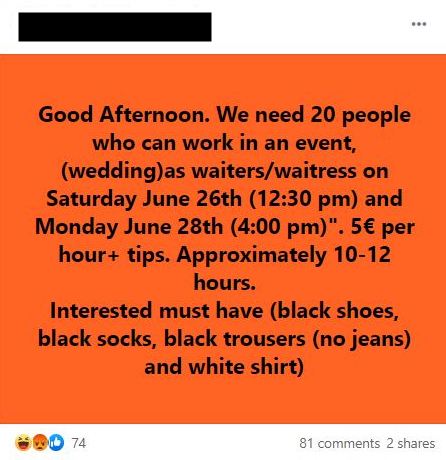With the battered hospitality industry in Malta restarting, employers have reported a major shortage of staff, as expats who traditionally worked in the majority of these positions lef the country or took up positions in better-paid or more stable industries.
The staff shortage has seen, in a reversal of previous trends, the jobs market for ostensibly unskilled hospitality workers switch from an employers market, where multiple staff compete for individual roles, to one where multiple employers compete for the attention of single applicants.
Abroad, in countries where hospitality industries are similarly reliant on imported labour, it is expected that rising vacancies will be accompanied by a rise in advertised pay rates – eventually.
According to a report by The Economist, for example, some UK experts have recorded an increase in pay already, with average advertised pay in food preparation and service roles being nudged up since the start of the year from £9.25 (€10.79) to £9.40 (€10.97).
However, some employers are lagging behind, and locally, even though the staff shortage seems to have hit especially hard, with some restaurants have been forced to reduce service, many employers are seemingly still unwilling to increase the remuneration they’re offering to attract staff.
In an illustrative example of this, one of Malta’s aspiring employers drew ridicule and anger on Tuesday, calling for 20 employees to work 10 to 12-hour shifts as wedding serving staff, for a meagre “€5 per hour+ tips”.

The (since-deleted) advert insisted staff provide their own uniforms, including black shoes, black socks and black trousers and a white shirt, and said that jeans are unacceptable.
The pay, which is actually above Malta’s minimum wage for those aged 18+ of €4.53/hour (assuming a 40-hour working week), would be complemented by tips.
Posted on a forum for expats in Malta, responses to the advert were resounding negative, with people pointing out that the rate is below a regular wage for wedding work, and that tips would be minimal, if anything, considering people don’t usually tip wedding staff.
A recurrent theme in the comments was the suggestion that the €5/hour is “slavery pay”, and that for that rate, the staff would likely not be invested in providing good service to customers.
“For €5 an hour are you expecting the staff to be interested? To engage with guests and ensure they are having a good time? You are setting yourself up for awful reviews of service – but then you deserve nothing less when you pay appalling wages”, said one commenter.
Another, decrying coverage of the staff shortage, claimed that adverts like the aforementioned are the reason “papers are running articles every other day because no one wants to work in hospitality”.
“Pay peanuts, get monkeys”, the individual advised.
It is not the first time a job advert has provoked an angry response in the months preceding now, however.
A similarly unpopular advert that made the rounds on social media advertised for a full-time housekeeper, fluent in both Spanish and English, qualified with a university degree, to be paid minimum wage, according to Maltese laws, and required a university degree.
These discussions take place against the backdrop of increasing debate on the state of minimum wage laws in Malta.
According to a recent report by the European Foundation for the Improvement of Living Conditions, Malta’s statutory minimum wage has not kept up with the growth of average wages between 2009 and 2021.
Hospitality employees (along with construction industry employees) seem to bear the brunt of this, with those employed in Malta’s accommodation and food services industries being paid the second least out of any sector, on average.
European Parliament adopts regulation making it easier for companies to be paid on time
The maximum credit term under the new Late Payment Regulation is to up to 120 days, for some sectors
French ATC strike forces Ryanair to cancel over 300 flights, affecting 50,000 passengers
The low-cost carrier is demanding the EU carries out reforms to ensure travel continues undisrupted
Valletta ranks 8th most expensive European capital city to live in – study
While London is the most expensive, Bucharest is the most affordable






